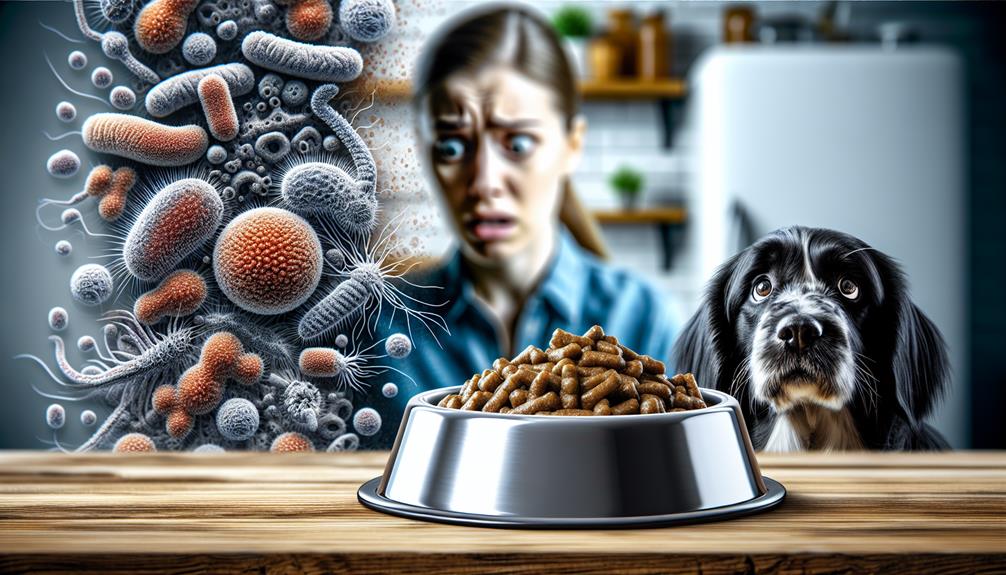The potential health risks associated with undercooked dog food warrant careful consideration by pet owners. Contaminants such as Salmonella and E. coli can pose serious threats, leading to gastrointestinal distress and, in severe cases, systemic infections. Additionally, the nutritional adequacy of such diets often comes into question, raising concerns about long-term health implications. As pet owners increasingly explore alternative feeding methods, understanding the full spectrum of these risks becomes essential. What precautions should be taken to guarantee both safety and nutritional balance in your pet’s diet? Many pet owners overlook the hidden dangers of undercooked dog food—could your furry friend be at risk? Discover the alarming truth.
Key Takeaways
- Undercooked dog food can contain harmful pathogens like Salmonella and E. coli, leading to severe gastrointestinal illness.
- Symptoms of bacterial infections from undercooked food include vomiting, diarrhea, and abdominal pain, potentially resulting in septicemia.
- Raw diets may cause nutritional deficiencies, affecting essential vitamins and minerals, leading to skeletal issues and weakened immune function.
- Incomplete cooking can disrupt digestive health, causing malabsorption syndromes and inflammation in the gastrointestinal tract.
- Proper food safety practices are crucial, including cooking meats to safe temperatures and maintaining hygiene to prevent cross-contamination.
What Are the Health Risks of Feeding Your Dog Undercooked Food?
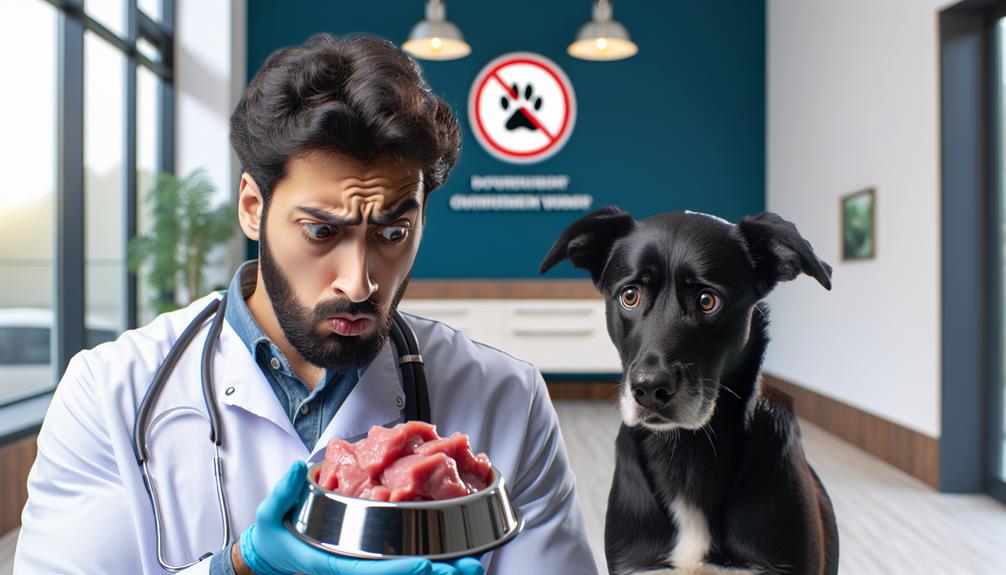
Feeding dogs undercooked food poses considerable health risks, including exposure to harmful pathogens such as Salmonella and E. coli, which can lead to severe gastrointestinal illness and other systemic infections. These pathogens are often present in raw meats and can survive even partial cooking, increasing the risk of infection for pets and their human companions.
Gastrointestinal issues arising from these infections may include vomiting, diarrhea, and abdominal pain, markedly impacting a dog’s overall well-being. Additionally, the ingestion of contaminated food can lead to more severe complications, such as septicemia, where bacteria enter the bloodstream, posing a serious threat to health.
Food safety is paramount when it comes to pet nutrition. Pet owners must ascertain that the food they provide is adequately cooked and free from harmful bacteria. Understanding the risks associated with undercooked diets is essential for maintaining a healthy and safe feeding regimen.
How Can Undercooked Dog Food Lead to Bacterial Infections?
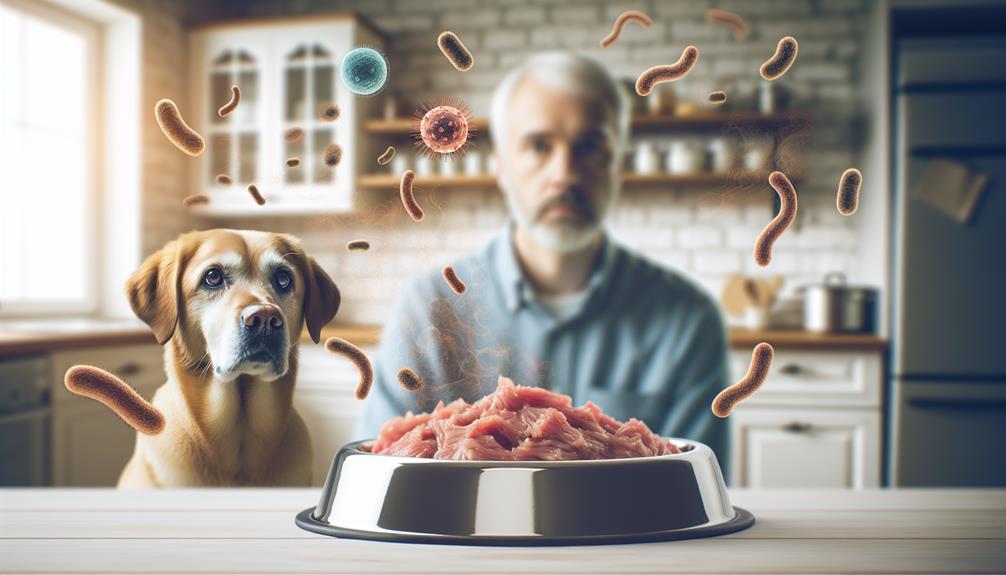
Undercooked dog food can serve as a breeding ground for pathogenic bacteria, greatly increasing the risk of bacterial infections in canines. Raw protein sources, such as chicken or beef, may harbor harmful microorganisms like Salmonella, E. coli, and Listeria. When these bacteria proliferate in undercooked dog food, they can lead to severe gastrointestinal disturbances and systemic infections in affected pets.
Contamination can occur at various stages, including during animal processing, food preparation, or even through improper storage. The presence of these pathogens poses significant threats to pet health, as canines may exhibit symptoms ranging from vomiting and diarrhea to more serious conditions requiring veterinary intervention. Additionally, certain breeds or individuals with compromised immune systems may be especially vulnerable to these infections.
To mitigate these risks, pet owners are strongly encouraged to seek veterinary guidance before shifting their dogs to a raw or undercooked diet. By understanding the potential dangers associated with undercooked dog food and implementing safe handling practices, pet owners can help guarantee the well-being of their beloved companions while minimizing the risk of bacterial infections.
What Nutritional Deficiencies Are Associated with Raw Feeding?
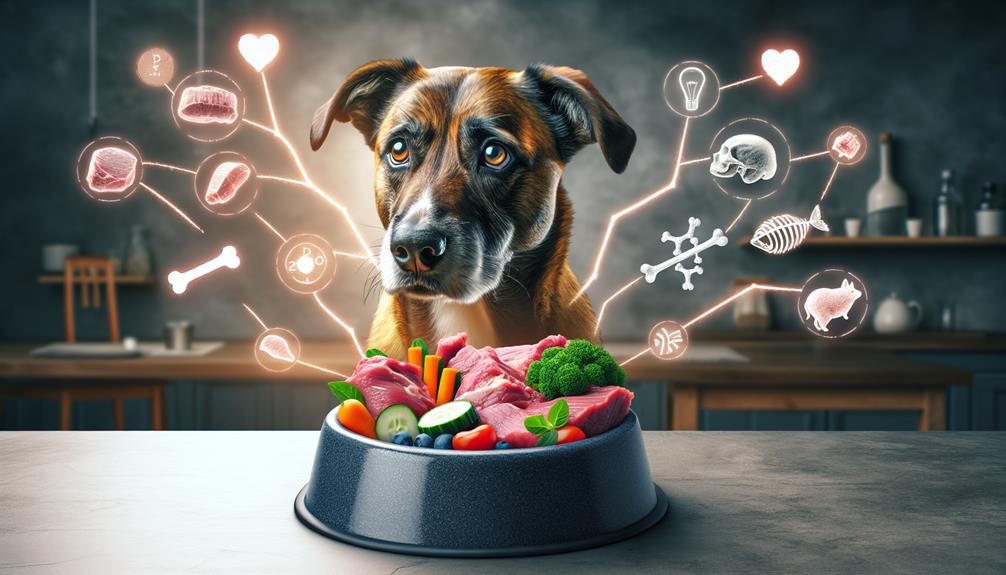
While proponents of raw feeding often emphasize the diet’s natural appeal, it is important to recognize that such feeding practices can lead to significant nutritional deficiencies in dogs if not carefully managed. A raw diet, which may prioritize meats, organs, and bones, can inadvertently neglect essential vitamins and minerals necessary for a dog’s overall health.
Common nutritional deficiencies associated with raw feeding include imbalances in calcium and phosphorus, which are essential for bone health, as well as deficiencies in vitamins A, D, E, and B-complex vitamins. These deficiencies can pose serious health risks, including skeletal issues, compromised immune function, and poor coat quality. Additionally, the lack of certain essential fatty acids can lead to skin irritations and inflammation.
To mitigate raw diet risks, it is crucial for dog owners to prioritize well-balanced dog food first, ensuring that their pets receive all necessary nutrients. Consulting with a veterinary nutritionist can help tailor a raw diet that meets specific dietary needs while minimizing the potential for deficiencies.
Ultimately, a well-rounded approach is fundamental for sustaining the health and vitality of our canine companions.
How Does Undercooked Food Impact a Dog’s Digestive Health?
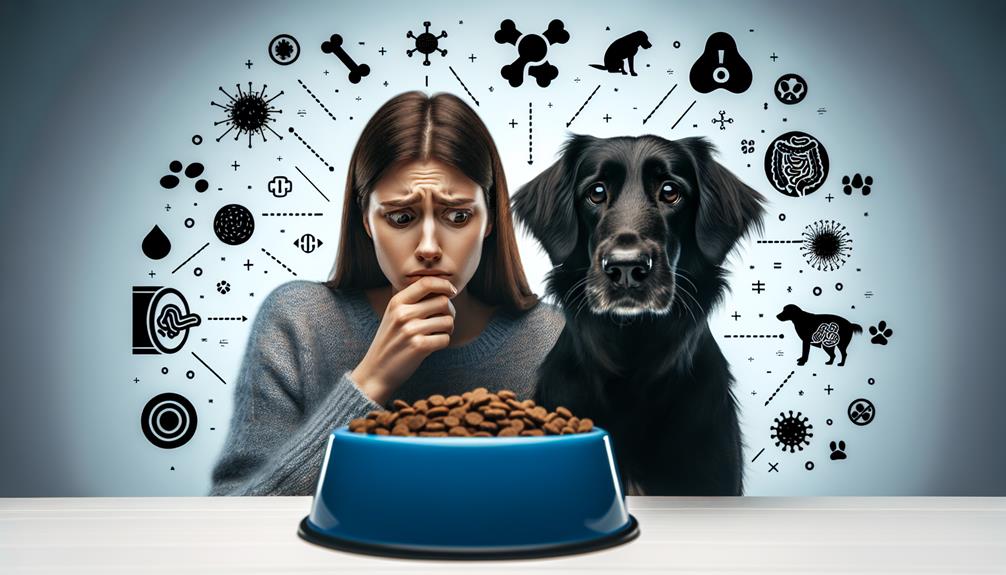
The consumption of undercooked dog food can greatly disrupt a dog’s digestive health, leading to a variety of gastrointestinal issues. Undercooked proteins may contain harmful pathogens such as Salmonella and E. coli, which can trigger severe diarrhea, vomiting, and abdominal pain. The presence of these bacteria can compromise the gut microbiome, vital for proper digestion and nutrient absorption.
Moreover, the incomplete cooking of food can render certain nutrients less bioavailable, exacerbating deficiencies and impacting overall health. A dog’s digestive system is designed to process fully cooked food, and when presented with undercooked options, it may struggle to efficiently break down and assimilate the nutrients. This can lead to malabsorption syndromes, where essential vitamins and minerals are not adequately absorbed, resulting in long-term health implications.
Additionally, undercooked food can induce inflammation in the gastrointestinal tract, further complicating digestive processes. As a result, pet owners may notice changes in their dog’s behavior, such as lethargy or loss of appetite, signaling underlying digestive distress.
It is vital to understand these potential impacts to guarantee the well-being of our canine companions.
What Precautions Should Be Taken When Preparing Homemade Dog Meals?

When preparing homemade dog meals, it is imperative to adhere to strict food safety protocols to prevent contamination and verify the nutritional adequacy of the diet. First, ascertain all ingredients are fresh and sourced from reputable suppliers. This reduces the risk of pathogens that can compromise your dog’s health.
Hygiene is paramount; wash your hands, utensils, and surfaces thoroughly before and after food preparation. Cross-contamination can occur when raw meats or poultry come into contact with vegetables or cooked foods. Utilize separate cutting boards for meat and produce to mitigate this risk.
Cooking meats to the recommended internal temperatures is essential, as it eliminates harmful bacteria such as Salmonella and E. coli. For instance, poultry should reach an internal temperature of 165°F (75°C). Additionally, avoid using ingredients toxic to dogs, such as onions, garlic, and chocolate.
Lastly, consult with a veterinarian or a pet nutritionist to confirm that your homemade meals meet your dog’s specific dietary needs. This will help maintain their health and well-being while ensuring that your efforts contribute positively to their overall welfare.
Finally to mention,
The adage ‘an ounce of prevention is worth a pound of cure’ underscores the importance of ensuring food safety for canine companions.
Undercooked dog food poses significant health risks, including bacterial infections and nutritional deficiencies, which can adversely affect overall well-being.
Proper preparation and adherence to safety guidelines are essential to mitigate these risks.
Consulting with veterinarians prior to dietary changes is vital for promoting ideal health and preventing potential gastrointestinal and systemic complications in dogs.

